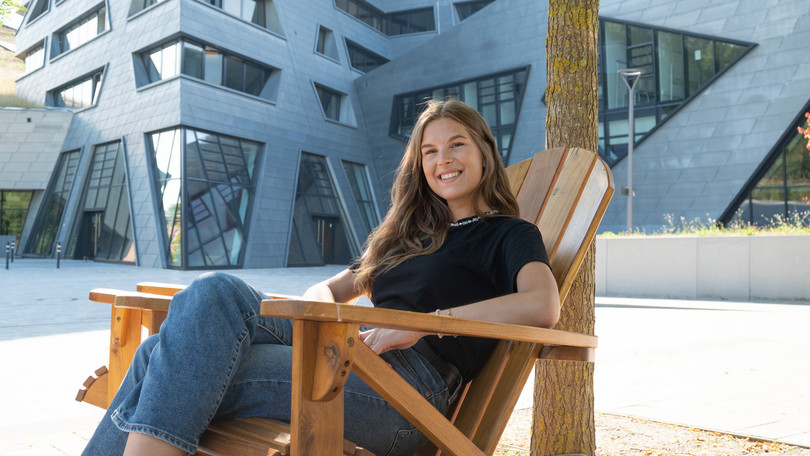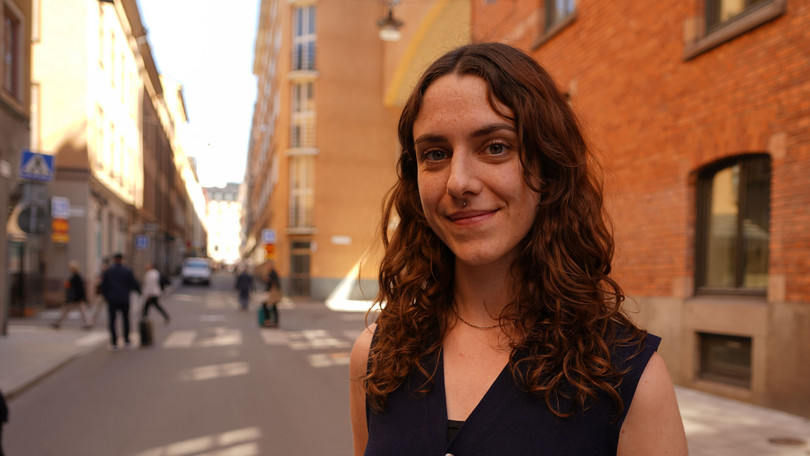Media and Digital Cultures
History - Philosophy - Aesthetics
Understanding the reality of "digital cultures" in its dynamics and consequences is one of the most urgent tasks of our time. For more than half a century, digital media have unfolded their culture-generating power in all areas of life. They have thus fundamentally changed the perception of the past, the aesthetic forms of communication, the concepts of our thinking and the ways we live together.
In the Master's programme Media and Digital Cultures, you will learn how to engage with complex topics in a way that is precise in terms of content, historically reflective, and technically and methodically trained, thereby creating opportunities for the present and the future.
At a Glance
- Degree awarded: Master of Arts (M.A.)
- Application deadline: EU degrees: 1 June / Non-EU degrees: 1 May
- Highlights: Applying knowledge from established humanities disciplines to digital cultural disruptions; an international research network; historical, philosophical, sociological and aesthetical methods; in-depth investigation and thus profound reinterpretation of digital cultures, their origins and dynamics
- Is aimed at: Graduates of all humanities and social science disciplines who are interested in history, philosophy, arts and media
- Type of programme: academic prerequisites
- Study Places: 25
- Start date: Every winter term, October
- Extent: 120 ECTS
- Duration: 4 semesters
- Language: German, some electives in English
- Location: Lüneburg
- Semester contribution: approx. 450 EUR
The Programme
Content
The Media and Digital Cultures study programme imparts the tools of thought and analysis of the humanities and social sciences to intellectually grasp digital cultures and act within them in a reflective way. These include historical and philosophical as well as aesthetic and sociological expertise.
On this basis, the Master's programme qualifies students to develop systematic, empirically sound and theoretically advanced knowledge about the genesis, dynamics and consequences of digital cultures. Fundamental problems in cultural studies, such as meaning, knowledge, technology, subject, power, etc., play an essential role in questions such as:
- What are the decisive sites of the development of digital cultures?
- What new cultural techniques do they establish and with what consequences?
- How do current changes relate to other historical upheavals, such as technological, social or aesthetic ones?
- How do digital cultures change our perception of the past and the future and scientific practice?
- What concepts and methods are required to develop digital cultures?
- What role does the knowledge of cultural studies subjects play in digital cultures?
In and with digital cultures, social structures and processes of being together and communicating, relationships of organisation and work are changing. Equally affected, however, are aesthetic experiences and design practices as well as basic historical concepts and philosophical concepts.
The Master's programme is based on the notion that interdisciplinary work is only possible through knowledge and mastery of disciplinary methods and epistemologies. At the same time, these are subjected to critical expansion and revision because digital cultures also change the university itself.
The Master's programme in Media and Digital Cultures is embedded in an international research context on digital cultures and is committed to the renowned German-language tradition of the Erste Kulturwissenschaft and German Media Theory.
Structure
The Masters Media and Digital Cultures comprises modules in four different areas: Core Area, Elective Area, Cultural Studies Integration Area and Complementary Studies.
The four core modules focus on the following subject areas:
- History
- Philosophy
- Social Organisation
- Aesthetics
The special feature here is to counter a cultural loss of order and orientation by focusing on fundamental historical, philosophical, aesthetic and social questions and to make the experience and knowledge of the disciplines involved fruitful for understanding digital cultures.
In addition to the core modules, students can access a wide range of topic-oriented electives to pursue questions about media and digital cultures on concrete phenomena:
2nd Semester (2 x 5 CP)
- Democracy, Public, Emancipation (5 CP)
- Gender, Queerness, Bodies (5 CP)
- Organization, Power, Economies (5 CP)
- Arts, Museum, Archive in Practice (5 CP)
- Media, Technology, Knowledge (5 CP)
3rd Semester (2 x 5 CP)
- Film, Sound, Text (5 CP)
- Capitalism, Conflict, Disruption (5 CP)
- Migration, Circulation, Mobility (5 CP)
- Organization, Aesthetics, Materiality (5 CP)
- Cities, Urban Spaces, Infrastuctures (5 CP)
Students also take modules in two other areas. The first is the Cultural Studies Integration Area, in which they get to know the history, methods and current debates of cultural studies together with fellow students from other Master's programmes. Core, elective and integration areas are brought into a functionally balanced relationship here. Students can independently set thematic and methodological focal points and pursue them in a targeted manner in order to find a disciplinarily informed and technically competent approach to interdisciplinary cultural studies research.
The second area is Complementary Studies in which students have the opportunity to generalise and specify their studies. In exchange with students from all Master's programmes, they can broaden their understanding of other subject cultures and issues, as well as deepen their knowledge of the discipline (especially with a view to an academic career).
Together, the four components mentioned above prepare students for the research-based Master's thesis. A Master's forum serves as a colloquium in which students present and discuss their own research work.
Here you can find further information on the course content of the Master's programme Media and Digital Cultures.
Specifics
The Master's programme is based on the conceptual and methodological competences of different subject traditions in order to ground an informed and differentiated interdisciplinarity on them. This enables students to pursue their own topics, objects and research interests from multiple perspectives and to competently meet the historical, philosophical, aesthetic and social challenges of digital cultures.
To this end, the study programme teaches methods of source-oriented, historical work as well as an understanding of media-historical questions and ways of explanation. These are supplemented by (organisational) sociological theories and methods on the relationship between technology, work and organisation. The same applies to the relevant lines of philosophical thought, its concepts and their viability for the penetration of digital cultures. Finally, students deal with the aesthetic standards of digital cultures and the interplay between perception and technology.
The Master's programme Media and Digital Cultures is part of an overarching specialisation at Leuphana University Lüneburg that has been established for about 15 years, which in turn is reflected in a corresponding appointment policy and international research contexts. Students and lecturers thus work in a research-intensive, interdisciplinary and international environment.
Study Regulations and Subject-Specific Schedule
The following link provides access to documents which set out the general conditions for examinations, an overview of the curriculum, as well as detailed and legally binding regulations.
General Assessment Regulations and the Subject-Specific Schedules
Teaching Personnel
Programme Director
- Prof. Dr. Claus Pias
Lecturers in the Core Area
Most of the core modules in order of the "Media and Digital Cultures" cultural studies programme are taught by: Prof. Dr. Claus Pias (Media Theory and History of Media), Prof. Dr. Erich Hörl (Media Culture and Media Philosophy), Dr. Amber Harper (Media Theory and History of Media), Dr. Christian Voller (Media Culture and Media Philosophy) as well as the professorship for Media Aesthetics and Media Technology (N.N.).
The integration modules and electives are taught by all lecturers at the Faculty of Humanities and Social Sciences.
International Research Context
- Institute for Culture and Aesthetics of Digital Media (ICAM)
- Centre for Digital Cultures (CDC)
- DFG Doctoral Research Group "Cultures of Critique”
- Summer Academy on Media and Humanities (together with Stanford University)
- European Summer Academy (together with Copenhagen Business School and the University of St. Gallen)
Studying Abroad
You can organise a semester abroad through the Erasmus+ programme or as a free mover. We recommend the third semester for your semester abroad. You can find more information on our partner universities on the International Center pages.
Career Prospects
The Master's programme is not a practical media course, but an academic programme that qualifies students for academic career paths. Its orientation towards the cultures of the humanities particularly favours further academic qualification (doctorate). At the same time, the various options also allow students to acquire skills for professional fields that require creative and reflective thinking, e.g. in the field of journalism and public relations, media and communication consulting, in cultural institutions such as museums, art and exhibition halls, international cultural institutes, libraries or archives, in the field of cultural policy, in NGOs, foundations, as well as in media companies.
Leuphana Graduate School enables graduates of the programme to make a smooth transition to the doctorate in order to pursue a career in academia.
With the Doctoral Track, qualified Bachelor graduates have the opportunity to be admitted to a doctoral programme from the first semester of their Master's programme, to enrol in the doctoral courses and to become part of the scientific community. The students are integrated into a thematic doctoral research group that corresponds to their research topic. This enables them to plan their Master's and doctoral studies to build on each other.
On the Leuphana Career Service website, you will find numerous job offers for student jobs, internships, career entry, or topics for your thesis from companies, research institutions, and non-profit organizations that are specifically aimed at Leuphana students and graduates. In addition, you will find job offers and student jobs within Leuphana University.
Doctoral Track
As a student in our programme, you have the opportunity to start your doctorate early via the Doctoral Track.
Thus, you to become part of the scientific community of our doctoral research groups at an early stage, giving you the unique opportunity to combine your Master's and doctoral studies and, with your doctorate in sight, to obtain your Master's degree en-route.
Admission Requirements and Application
You can find all information about the admission and requirements, the application and the selection procedure on our "Admission and Requirements" page.
As part of the selection process for the MA Media and Digital Cultures, you will be invited to an interview in calendar week 35 (25 & 26 August) or 37 (8-12 September). The purpose of the interviews is to gain a personal impression of your interests and motivation, as well as your suitability. In addition, the interview offers you the opportunity to gain up to 18 additional points in the selection process and thus improve your chances of being accepted to study in Lüneburg. The 15-minute interviews will be conducted online. Invitations to the selection interviews will be sent by email approximately one week before the interviews. No preparation is required.
Additional Links
International Students
This study programme matches your interests? Then you will find further information for prospective international students on residence and social matters, such as visa, residence permit, health insurance or finding accommodation, on the following pages.
Please note that the information for incoming exchange students and international degree-seeking students differs slightly.
Contact and Counselling
First contact point
The Information Office (Infoportal) is your contact point for
- general information on the application procedure
- initial questions about the study programmes offered at Leuphana
- making an appointment with the Graduate School Student Counselling Service.
Information Office
Building 8, Ground Level
Fon +49.4131.677-2277
studierendenservice@leuphana.de
Campus opening hours
Mon - Thu 9.00 am - 4:00 pm
Fr 9.00 am - 12 noon
Student Counselling
To make an appointment with our Student Counselling Service, please use our booking tool on our website.





